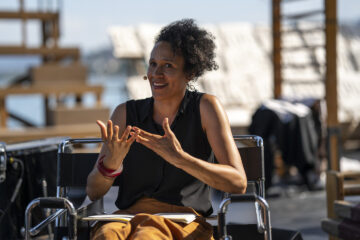Women’s bodies in a discriminatory patriarchal society remain confined to moral norms and to the patriarchal inheritance that is imposed specifically upon them. Such state of being underhanded subjects women’s body shape to interventions and affects the ways in which such bodies are expressed, and their own representations.
Imposing commandments on women’s bodies: the beginning
Based on many studies and references from Marxist literature (perhaps the most important being The Origin of the Family, Private Property and the State by Friedrich Engels), the emergence of private ownership of land and the transition from a subsistence society to a class society was associated with an attempt to impose commandments on women’s bodies. This limited their freedom and confined their social roles to jobs considered secondary.
Throughout history, the imposition of governance over women’s bodies rose from the emergence of the first signs of private ownership of land and the establishment of a patriarchal society. Consequently, it appeared from the need of those who would inherit these lands. The parentage of children previously attributed to the mother had to be disintegrated, imposing chastity on women only, while men could choose wives and girlfriends as desired, so long as it did not prejudice their land ownership.
This oppression came as a result of a discriminatory class society based on hierarchy and differentiation. It is subject to analysis, genealogy, deconstruction, and change, as it comes into being within the existence of the material basis for its establishment, vanishing with its extinction. Thus, it does not express an eternal intrinsic nature. It does not result from it, neither from an assumed essence of women.
The greater the oppression of women, the greater the siege on their private lives
Women are the ancient deities that primitive man both desires and dreads. Previously, their status rose and their word was supreme, due to their important economic and productive role. From Ishtar, Inanna, Al-Lat, Al-Uzza, to the Amazigh priestess, men gradually took control of heaven and earth and began enslaving women, violating their rights and limiting their freedom.
In an attempt to keep the inheritance for children, a siege was imposed on women’s bodies. And the lower the rank of women in society, the more the blockade increased until it became a siege on women’s freedom in the intimacy of their private lives. This siege extended until it became evident in the imposition of commandments on our garments and our behavior as women, which is one of the forms of self-expression that has become, for religious people and moralists, a point of discussion, blatant interference, more production of violence, interference with our freedom, and disrespect for our being, our bodies, and our own representation of them.
The body and freedom
Due to fear of women’s bodies, the expression of and by the body is a coupling that is intended to be suppressed. Perhaps an example of this is what the women of Tunisia experienced during the period of the French occupation in terms of violations by several parties who agreed to suppress women and control their personal freedom. Tunisian thinker Al-Taher Al-Haddad was strongly confronted by Tunisian society and Islamists due to his book Our Woman in Sharia and Society, in which he called for the liberation of women from the authority of obsolete customs and erroneous readings of Sharia.1
Later the book Mourning for Al-Haddad’s womanwas published, in which Muhammad Salih bin Murad responded to Al-Taher Al-Haddad in a way that reflects the dominance of dark thought during this era that lacked the minimum elements of women’s freedom and dignity.
Tunisian women lived during the colonial period under the burden of ignorance, stultification, the control of customs and traditions, polygamy, and the abuse of divorce. Men have the freedom to keep or divorce women without referring to the judiciary while women don’t have the slightest right to choose a partner, neither to remain, or not, in a marital relationship.
After independence, the president Habib Bourguiba took off the headscarf of a Tunisian woman in front of a large crowd. The initiative was confronted with repulsion by Tunisian society, a major controversy was raised and extended to Arab countries, and Bourguiba was accused of being anti-Islamic.
There may have been a similar and more bloody context during Algeria’s Dark Decade,2 in terms of violence against women and a blockade of their freedom to dispose of their clothes and bodies, go out into public space and express themselves. It was a time of utter guardianship of women’s bodies and persistent violence against them.
Despite the absence of documentation about violence against women during the period between 1992 and 2002, the testimonies of female victims of rape and sexual violence were transmitted. Some civil society organizations provided approximate numbers ranging from 5,000 to 10,000 women and girls who were subjected to sexual assault during the period between 1993 and 1997. Victims were mainly working women, and those who exercised their right to freedom of expression in the public space.
The battle for freedom is the battle for the existence and continuity of women. Tunisian women’s attainment of a set of civil rights and privileges after independence was followed by further struggles for education, work, and participation in public life, despite the shortcomings of The Code of Personal Status (CPS)3.
Despite the different contexts of successive historical periods, women’s bodies and their freedom of expression remain the center of the conflict between conservative thought and progressive and feminist thought aspiring for emancipation. Even after the relative gains Tunisian women achieved after independence, their rights are still a matter of controversy and debate. And let’s not forget imaginary issues launched by the Islamists through the Ennahda movement’s attempts to abort what we have achieved, by passing regressive draft laws, which faced the backlash from feminists and Tunisian women who refuse to go backwards. This rejection prompted the Ennahda movement to back down from the wording of Article 28 of the 2014 Constitution, which stipulated that women are complementary to men. However, they are once again discussing the issues of the religious enforcement of the headscarf and polygamy in the media in general, in an attempt to normalize reactionary ideas that advocate for women’s oppression and imposition of guardianship over them.
Consequently, all of the issues mentioned above point to the need for more unity and solidarity among women in the defense of their rights and their human existence, derived from the values of equality, freedom and social justice. Especially after the new electoral law that excluded women from real political participation, which led to the production of a parliament dominated by masculinity, disrespecting, therefore, the principle of parity.
The more women’s rights are violated, the more we notice attempts to return women to so-called natural roles. And the greater the fear of women’s liberation and self-affirmation in decision-making positions, the greater the besieging of our bodies as aspiring subjects to express our existence in the guise of equality and freedom.
The drift behind the guardians of values
In a society that lives under the propaganda of a dominant negative culture practiced by the caste system through its ideological tools, which are used to further subjugate and control women, all attempts at emancipation are curbed, practices and opinions are shaped, and the liberation of women, who live in fear of social stigma and the relentless demand for group recognition and approval over them, is suppressed. This is a context in which the patriarchal discourse derives its legitimacy from the authority of religion, customs, and traditions that play a major role in building social pressure on women. This leads to a decrease in our level of self-esteem, under the weight of violent power discourse, and due to the inability to easily deviate from public attitudes that fear women’s bodies.
Drawing the features of our self-image and shaping the feelings about ourselves, both include our evaluation of our essence, appearance, thoughts, feelings, personal characteristics, and the ways of expressing ourselves as we want and as we see fit, without guardianship from or over anyone. And that is a fundamental determinant of the extent of our self-satisfaction and our lack of commitment to either violent rhetoric and restrictions on our freedom. As Régis Debray says in his book Memoirs of a Petty Bourgeois Between Two Fires and Four Walls: “Your proud independence allows my proud independence. Give it and it will be given.”

Fatma Benmefteh is a member of the Tunisian Association of Democratic Women (ATFD, in French).
- Sharia is the Islamic law, based on faith derived from the Koran and hadith. It is used in several countries with a predominantly Muslim population. [↩]
- [2] It refers to the 1991-2002 Algerian Civil War. [↩]
- The Code of Personal Status was enacted in 1956 in Tunisia, less than five months after the country was declared independent from the French colonial power. It set forth a number of progressive laws to promote equality between women and men in areas including marriage, divorce, custody, and inheritance. It provided important changes in family law and women’s legal status in Tunisia. [↩]




